Crafting a successful Fintech SEO strategy requires recognizing the unique challenges it presents:
Fintech companies generally compete for visibility using highly competitive keywords – meaning a well-planned approach is paramount in distinguishing one’s presence at the top of Google’s SERPs.
In this article, we’ll dive into the components of Fintech SEO and how to build out a winning strategy to drive conversions.
Fintech companies thrive on establishing trust and credibility in an industry where “your money or your life” is not just a phrase but the reality of their customers.
Strong digital marketing, particularly SEO, plays a vital role in building this trust by enhancing the company’s online visibility and driving conversions.
Based on HockeyStack’s Self-Reported Attribution Report – it’s clear that SEO is not dead – and far from it.
Their analysis looked at over 8000+ conversions to understand the correlation between last-touch sources and self-reported attribution and how useful self-reported attribution is.
The findings?

This aligns with our experience on the usual top-driving customer acquisition channel for Fintech organizations – the SERPs are generally very competitive, but that is exactly where the conversions for most Fintech organizations ranking in top positions are coming from.
Strategically, SEO serves several key functions outside of the crucial customer acquisition component:
A well-rounded SEO strategy should be at the core of marketing efforts for every Fintech business.
Financial websites often host fewer than 10-20k pages, so the impact of technical search engine optimization (SEO) on digital marketing differs significantly from that in larger domains.
We consistently advise against going too deep into Technical SEO, unless there’s a good reason for doing so (serving multiple markets and languages, i.e. International SEO) – otherwise, it’s not a mover when it comes to driving bottom-line revenue and impact from SEO efforts.
While giants out there may have a vast number of pages to optimize and address issues related to algorithm changes, crawl budgets, and structural concerns, fintech and finance sites typically do not face such extensive technical challenges.
Further Reading: Technical SEO 101
However, neglecting SEO’s technical side is not advisable, even for smaller websites.
It’s crucial to understand that technical SEO lays the groundwork for a site’s success in the SERP.
The focus for smaller finance sites should be on the following key aspects:
Typically, an SEO Manager at a fintech company can personally address the majority of technical concerns.
While that is the case, achieving the desired traction on SERPs often requires collective efforts in content creation and establishing robust external links.
Building links within the financial technology sector presents unique challenges:
The cost associated with obtaining a backlink is one of the most costly compared to all other industries. It’s not uncommon for the overall link price to be within the 5-figure range – for a single link.
Unless there’s a significant budget available for link-building and digital PR activities, it’s better to invest time, money, and resources into proper natural link-building and getting scrappy.
When conducting link building within the Fintech space, keep the following in mind:
Entities aware of the profitability intent behind link building in fintech tend to be hesitant to endorse others. Consequently, savvy strategies and superior content are crucial for companies to earn that authoritative nod.
In the competitive realm of financial technology, traditional content marketing and inbound techniques might not suffice on their own.
Ranking for high-stakes keywords can prove to be a formidable challenge that requires time, budget, and patience.
An example of this would be targeting mid-sized and Enterprise customers within the US and going after the BOFU term “enterprise payment platform”
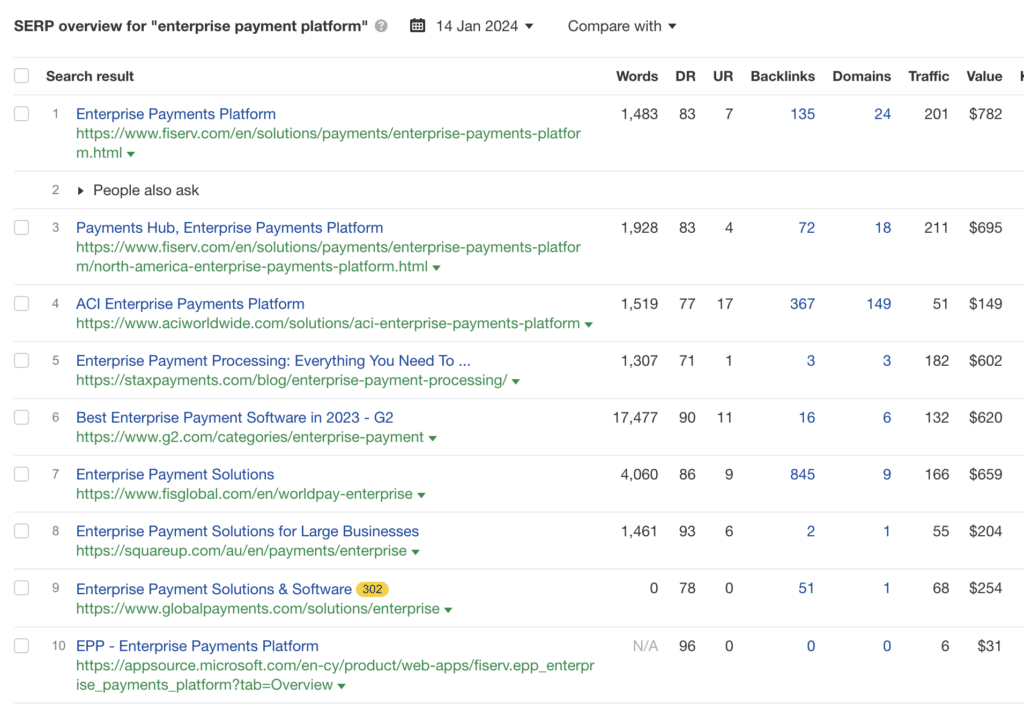
Depending on the domain’s current overall authority, cracking the top positions of these SERPs will likely take quite some time and effort.
This is where supplemental advertising, both paid social and Google ads, becomes a crucial component of a comprehensive digital marketing strategy.
Fintech businesses can’t rely solely on organic growth that other sectors might benefit from; brand visibility requires a deliberate push.
This visibility not only aids in earning organic backlinks but also enhances click-through rates and fosters trust in search results, further bolstering SEO performance.
For fintech companies targeting essential two-word finance terms, incorporating a robust advertising component into their marketing strategy is almost non-negotiable.
It boosts brand metrics, which are essential for attracting and converting leads online. Without such strategic advertising efforts, a fintech brand’s presence could be minimal, leading to subpar SEO outcomes.
A blend of strong content creation and targeted advertising should be at the heart of a fintech firm’s approach to scaling its brand and visibility for long-term success.
Programmatic SEO can open up a wide range of opportunities, depending on the exact vertical.
A good example of a potential low-hanging fruit pSEO exercise is owning branded search terms where searchers are looking for specific providers in a given market to integrate with.
Further Reading: Programmatic SEO Strategy Breakdown
Ayden, for example, relies on this method to generate the vast majority of its non-branded search traffic:
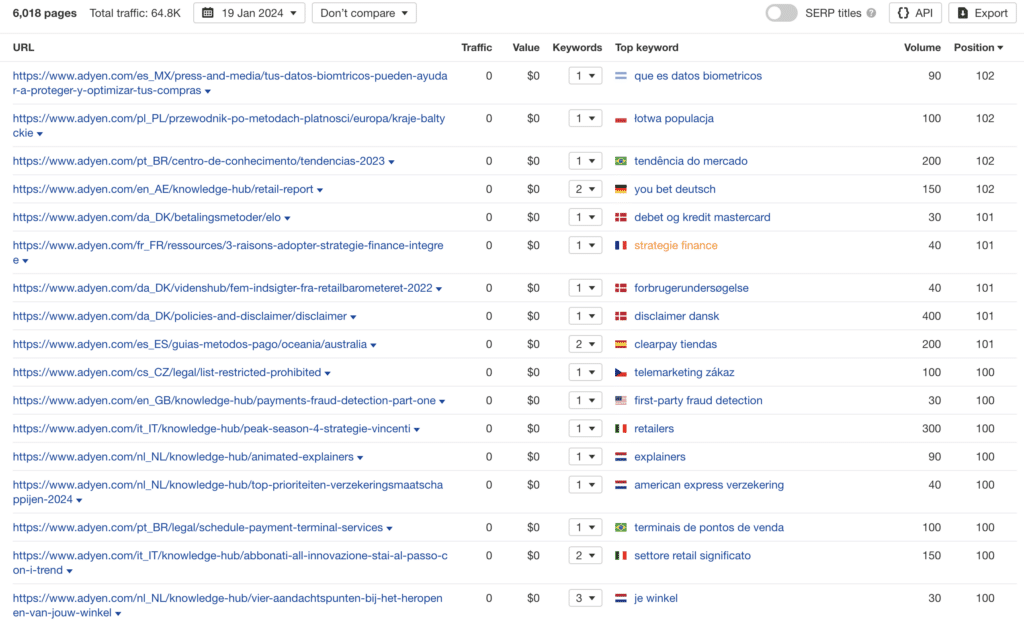
Their goal is simple—to own the branded search term + integration queries. They provide an overview of that local market, as well as a dedicated section and call-out for getting started integrating with that platform using Ayden.
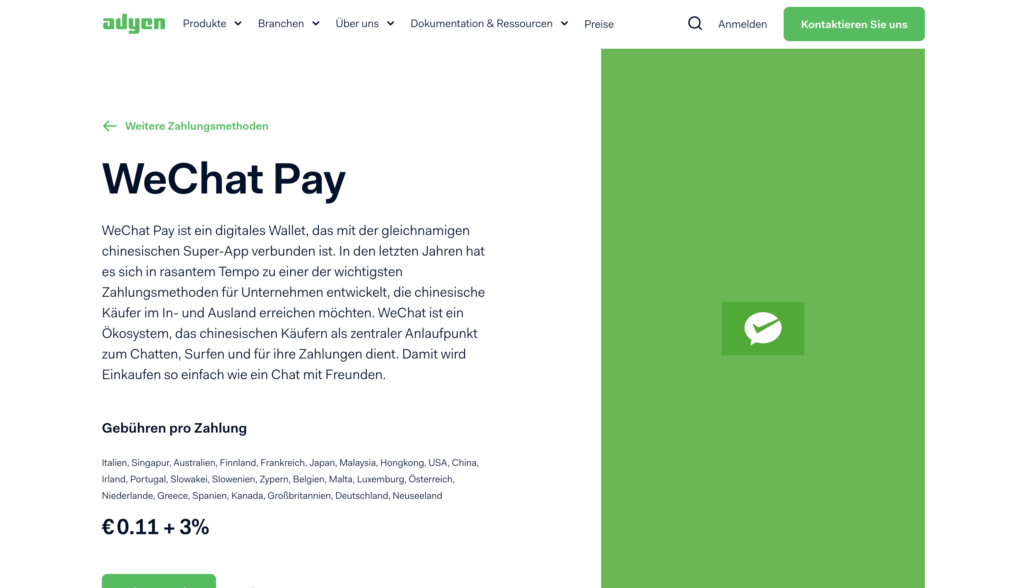
This also allows them to use retargeting via LinkedIn to run campaigns that retarget their ICP.
A strategic approach to link building within the Fintech space involves using the milestones within a company’s funding trajectory to generate high-quality links:
For instance, companies like NerdWallet have experienced the SEO benefits of publicizing their initial public offering (IPO), which sustains media interest over time due to recurring coverage of their financial reports.
The fintech landscape is dense, with over 10,000 startups in the U.S. and more than double that number worldwide.
In such a saturated space, securing authoritative links that are uniquely beneficial—and often unattainable through standard methods—is vital for climbing the search engine ranks.
To capitalize on your funding events:
Proper monitoring and execution can make it easy to leverage investment milestones to secure backlinks that bolster an organization’s online presence and SEO.
Efficient financial calculators can significantly enhance a fintech company’s website, attracting substantial organic links due to their high utility and the competitive nature of their associated search terms.
To ensure these tools deliver immediate value:
By focusing on these elements, fintech organizations can improve their search engine rankings while providing a seamless user experience that encourages the sharing and linking of their calculator tools.
Hypofiend is a great example of building calculators with low time-to-value that naturally generate links over time.
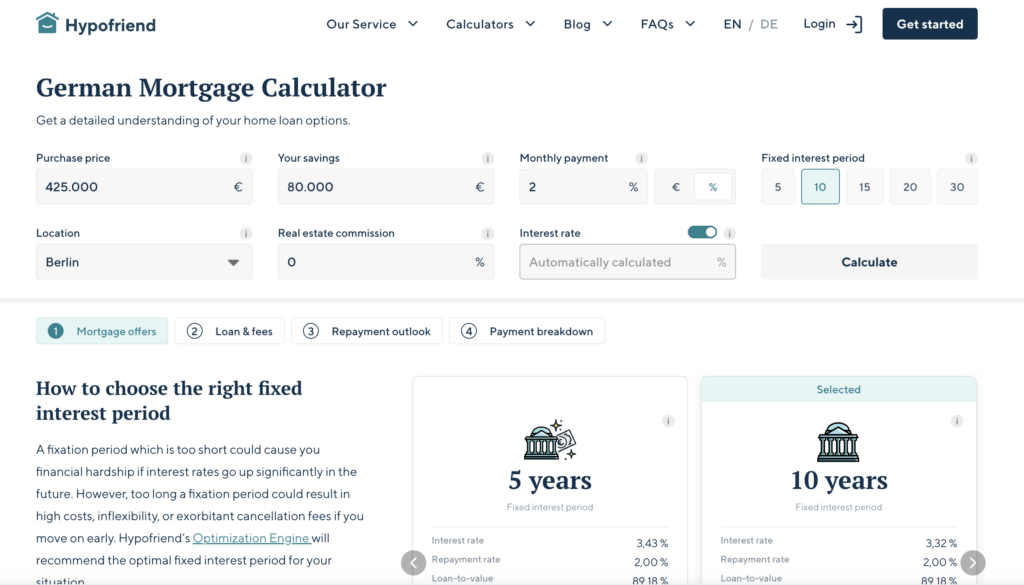
Accurate and efficient calculators resonate well with user queries, particularly when targeting long-tail keywords, and are essential for a sound SEO strategy in the competitive fintech space.
Establishing trust is paramount in the realm of financial services, where the stakes of the content’s impact on an individual’s finances are high.
For web content associated with financial matters—commonly known as Y.M.Y.L (Your Money or Your Life)—it’s essential that the information originates from or is verified by authorities in the financial sector:
An example to emulate is Nerdwallet, which enhances user trust by showcasing details about content editors and reviewers and enabling users to quickly view these professional profiles. This reinforces credibility and trust before the consumer engages with the content.
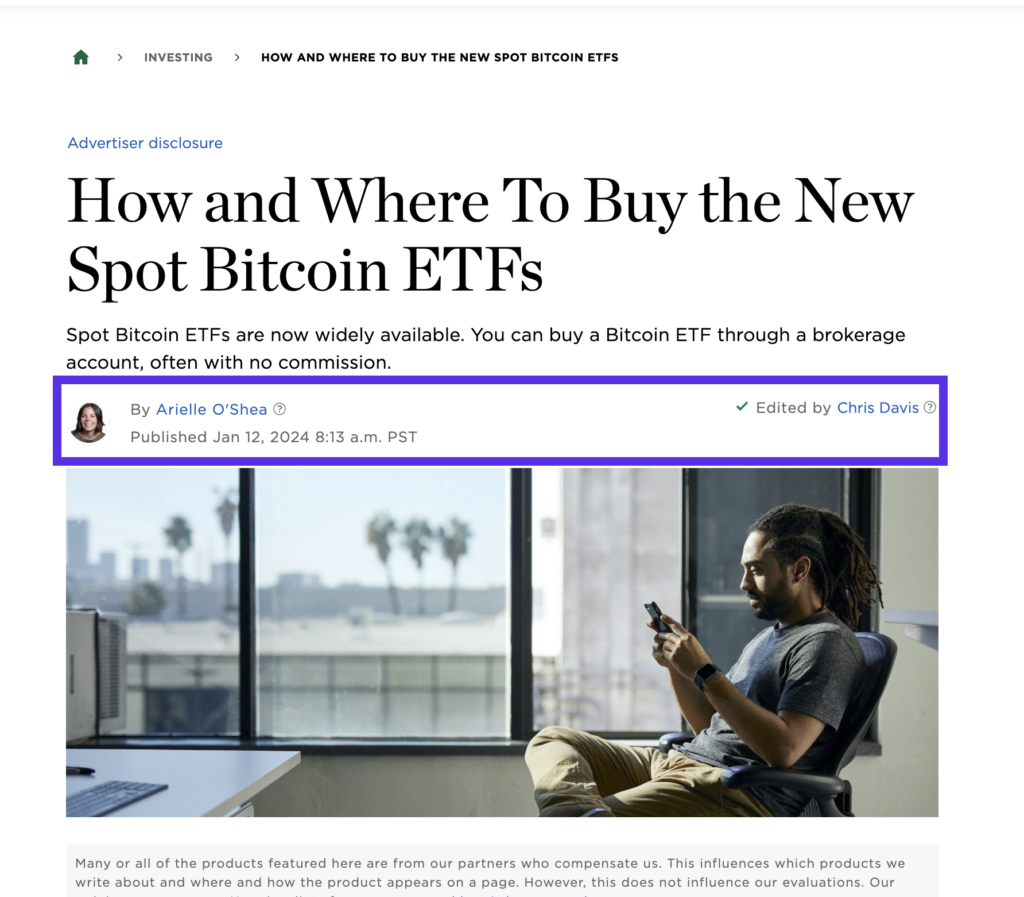
Fintech SEO is all about investing in high-quality content, building high-grade backlinks through proper execution, and ensuring trust and authoritativeness.
It’s no doubt that it’s an extremely competitive industry, and the time it takes to rank can be years to get to the top of the SERPs.
Success in competitive niches requires a blend of skilled content creation, strategic link acquisition, and a remarkable user-oriented product. With a robust strategy in place and a well-oiled machine – it’s possible to run even faster and hit those growth milestones much sooner than expected.
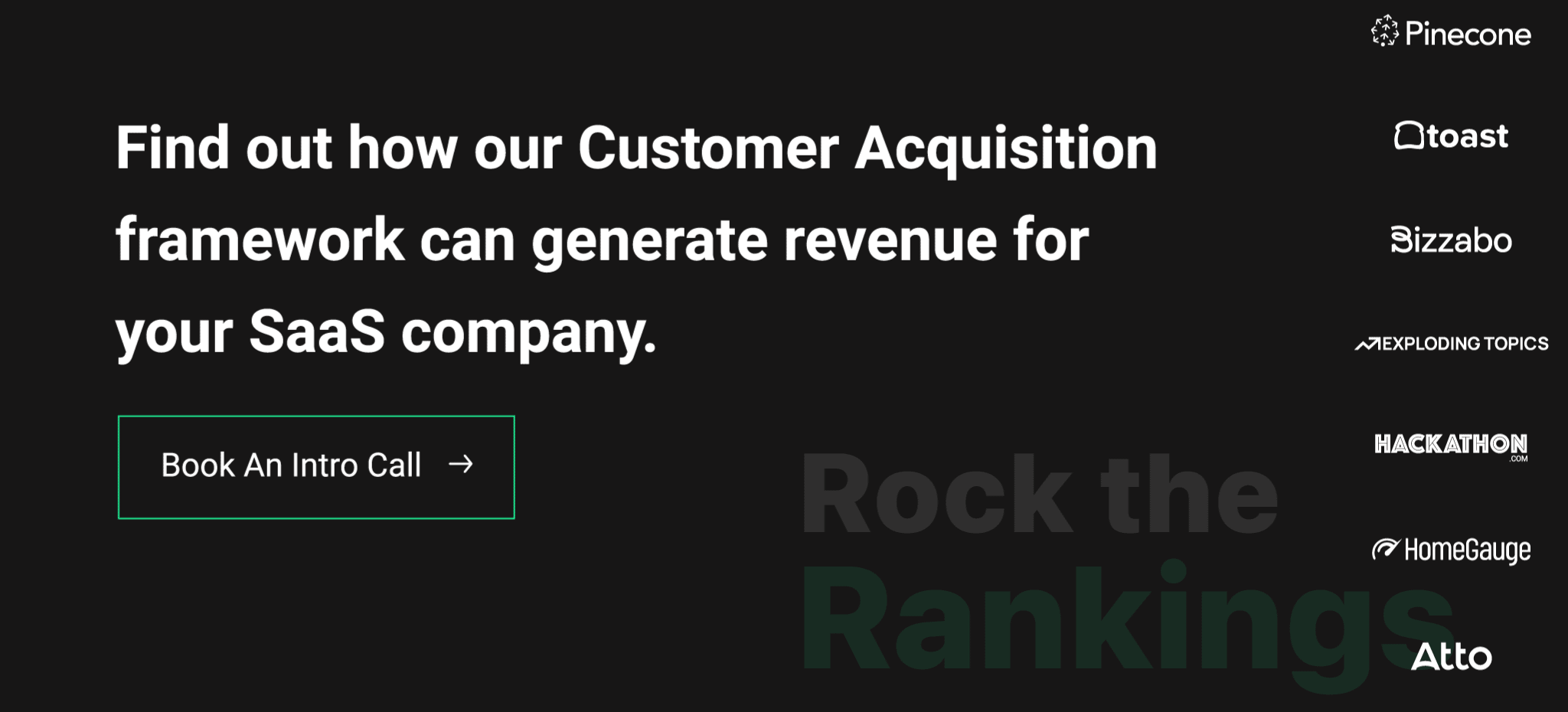
Founder of Rock The Rankings, an SEO partner that helps B2B SaaS brands crush their organic growth goals. An avid fan of tennis, and growing micro-SaaS businesses on the weekend. 2x SaaS Co-Founder – Currently working to build and scale Simple Testimonial.
Book a 1-on-1 call with our founder and walk away with a custom plan built for your business. Growth starts now.
BOOK INTRO CALL